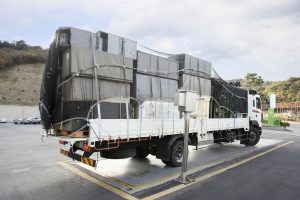Responsible for channeling both power and communication between the load cells and the indicator, load cell cables are an integral part of building a custom scale. Though not just any cable will work. See, load cell cables are selected based on the distance between the two parts, as well as certain environmental conditions like temperature, contact with abrasive or flammable materials, or even rodents.
 Before you can know the right type your custom scale project needs, it is best to have an understanding of the different types of load cell cables available.
Before you can know the right type your custom scale project needs, it is best to have an understanding of the different types of load cell cables available.
4-Wire Load Cell Cable
Perhaps the most common cable, the 4-wire load cell cable is used primarily for short distances. As its name suggests, this type consists of four wires:
- Power (excitation) +
- Power –
- Signal (output) +
- Signal –
Once connected, the cable should run from the scale to the indicator display. These wires are calibrated and designed to handle the surrounding temperatures. Many custom scale projects use the 4-wire load cell cable since it is more affordable and suitable for most scales. However, should you need additional length or if your scale is in an unpredictable environment, you may need to reconsider the type of load cell cable you are using.
6-Wire Load Cell Cable
Designed for longer distances and more difficult settings, the 6-wire load cell cable offers a lot more options. Again, as the name suggests, these load cell cables have six wires. They contain the four found above, as well as positive and negative sense wires. The long distances that 6-wire load cell cables cover can subject them to changes in resistance, temperature, and dips in voltage. The addition of these two sense wires helps to keep things flowing steadily.
Because they are not thermally compensated as the 4-wire load cell cables are, the 6-wires can be cut and used alongside other cables with no issue – making them perfect for larger commercial custom scale projects.
Types of Load Cell Cable Shielding
While 6-wire load cell cables offer a lot of benefits when designing a project, it is important to note the surrounding environment and opt for shielding that will protect the cable from any outside environmental factors. Below are the most common types of load cell cable shielding.
Hostile Environment Cable
Hostile environment cable is best used in environments that are, well, hostile. Depending on where the scale is being used, the cables may come in contact with harsh or abrasive substances, such as fuel, ether, or even salt. Over time, these substances can damage the cables.
Hostile environment cables are created with a polyurethane jacket that acts as a barrier against these damaging substances, keeping the cable safe and the scale running smoothly.
Rodent Protection Cable
Rodents and their incessant chewing may seriously interfere with a scale’s functionality. If in an environment where there are rats, mice, or other pests, the load cell cable may become enticing – leaving you with hefty costs to replace some or all of the cable.
Rodent protection cable is a type of cable that protects against this pesky situation. The outside layer of the cable is a braided shield making it difficult to chew. And, as an added defense, it is coated with a chemical that will discourage them from wanting to ever take a second bite.
Intrinsically Safe Cable
Flammable gases or liquids or generally hazardous materials can be damaging to load cell cables, requiring added security in the form of a jacket. For intrinsically safe cables, industry-standard blue double jackets are used to protect the cables from exposure to these dangerous materials.
High-Temperature Cable
In environments where the temperatures fluctuate or reach extreme highs, load cell cables need an outer covering that will protect the wires regardless of how hot it gets. A high-temperature cable is designed with a fluorinated ethylene propylene (FEP) jacket that insulates the wires and can withstand the heat without getting damaged.
Choosing the Right Load Cell Cable
Choosing the right load cell cable is important. If you would like to learn more about the different types of load cell cables or have questions about what would work best for your project, contact our sales department at (919) 776-7737. After all, at Central Carolina Scale, we have the largest inventory of load cell cables in the industry.
